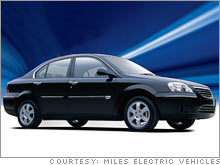An electric car for the common manOne company is hoping to bring a $30,000, 80-mph battery-powered sedan to the market by 2009.NEW YORK (CNNMoney.com) -- If all goes according to plan, by 2009 you could be sticking it to Big Oil by driving an all electric, Chinese-made sedan for little more than the cost of a Camry. Electric cars are nothing new. But until now they've either been very expensive to produce or, if not that, then small and relatively slow - little more than glorified golf carts.  Miles Rubin, with his $30,000 Miles XS 500, is hoping to change all that. According to Rubin, Founder of Miles Automotive Group, the XS 500 has a top speed of 80 miles per hour and a range of 120 miles at 60 miles per hour. That's about as fast as GM's late-90s era electric car, the EV 1. And the XS 500 will be a lot cheaper to produce, the company says. Both the low cost and the high range can be attributed to China, where low labor costs keep the price down and state-sponsored research into battery technology yielded what Rubin said was an advanced lithium ion power pack produced by Lishen Battery. Plug the car into a normal wall socket and, according to company literature, six hours later you've got a full charge. While this sounds like the perfect vehicle, serious challenges remain. The first, of course, will be bringing the car to market. Rubin said he'll have 6 prototypes of the XS 500 by the fall, but they still need tinkering to get safety approval from U.S. regulators, plus do additional battery testing. Then there's the competition. Phoenix Motors has a four-door utility truck with similar performance capabilities that it's planning on selling to the public around the same time. And Tesla Motors, makers of the $100,000 all-electric Tesla Roadster which is expected to enter limited production by the end of the year, has plans to enter the sedan market next. (An e-mail to the company seeking comment was not returned. For more on Tesla's sedan plans, as well the recent departure of that company's CEO read the Green Wombat blog.) The big automakers are also getting in on the electric game with their plug-in hybrids - vehicles that use an electric motor all the time but can recharge with both a plug and a conventional gasoline engine, giving them far greater range. General Motors, the only big automaker to announce anything like a target date, said Thursday mass production of its Volt plug-in should begin by 2010. Selling the car is another obvious challenge. Ford, GM, Toyota and Honda all had electric vehicles back in the late 1990s. They were sold in California at a time when state regulations basically required car makers to do so. All of them halted production after those regulations were changed. "But the world has changed," said Rubin. "We need to get off our reliance on oil and we need to alter our carbon footprint." Rubin has previously worked as a corporate lawyer and, later, headed several companies, including a company that sold metal forms to Detroit automakers. He most recently headed Polo/Ralph Lauren Jeans. Even if U.S. consumers flock to electric cars out of environmental concern, Rubin may still have to convince them to put their bodies inside a Chinese vehicle, especially in light of all the news lately of recalled Chinese goods. To ensure quality, he says there are inspectors in both Chinese factories that will produce the car. He also touts the car's safety features including as reinforced doors and both front and side airbags. "The cars will speak for themselves. You can PR it to death, but if it doesn't perform well, it's dead on arrival," he said. Rubin will also have to answer skeptics who wonder how an electric vehicle is actually better for the environment, given that the electricity to run the car is produced largely from coal and the nation's electric grid is strained as is. Rubin retorts that the electric grid is plenty capable of handling demand from electric vehicles, provided people recharge them at night. On the environmental question, he says just because electricity now is mostly made from coal and natural gas, renewables like solar or wind or carbon-free nuclear power could play a larger part of meeting the nation's electricity demand. Environmentalists also support the development of electric cars, noting that it's much more efficient to create electricity than it is to power a vehicle with a combustion engine. |
|

